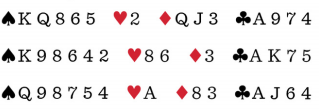Source: www.jerryhelms.com
Dear Jerry, As an avid reader of your column, I would like to take exception to the advice you offered in the November Bulletin. Holding: ![]() A J 10 3
A J 10 3 ![]() Q 10 7
Q 10 7 ![]() K 6 5 4 3
K 6 5 4 3 ![]() 8
8
you pass as dealer and the auction continues:
| West | North | East | South |
| Pass | 1 |
||
| 1 |
2 |
? |
You recommended a support-showing, invitational 3![]() cuebid. The overcaller bid 1
cuebid. The overcaller bid 1![]() , not 2
, not 2![]() , so he probably has only a five-card suit. After the opening bid and raise, suggesting around 20 points held by opener and responder, why not just bid 2
, so he probably has only a five-card suit. After the opening bid and raise, suggesting around 20 points held by opener and responder, why not just bid 2![]() , then 3
, then 3![]() if forced? Not Too High
if forced? Not Too High
Hi NTH, While it is true that a simple raise on this deal may keep you from getting too high, it may well keep you too low. Your assessment of high-card points held by the opponents could be reasonably accurate; the number of tricks available to either side, however, is not contingent just on high cards. In addition, I question the conclusion that the overcaller holds only a five-card suit. A simple overcall at the one level suggests two things:
1. A desire to compete for the contract, despite the fact that the opponents opened the bidding.
2. Lead information for partner.
Holding such strong spade support, you have an inference that partner may hold a good hand because his suit isn’t necessarily all that strong. As a matter of fact, I maintain that there are a number of hands that your side could and probably should bid game provided you choose the action that immediately and accurately reflects your strength and support.
Give partner any of the following hands:

and I cannot imagine not bidding a game if partner issues a limit raise via a 3![]() cuebid. If partner simply raises to 2
cuebid. If partner simply raises to 2![]() , I pass. If the opponents compete, either of us might bid to the three level, but making an overtrick at three is not nearly as good as bidding the cold game or at worst, a very good game. Note that on two of the examples, the overcaller held a six-card suit and, in my opinion, neither of them qualifies as a weak jump overcall based on the outside defensive strength.
, I pass. If the opponents compete, either of us might bid to the three level, but making an overtrick at three is not nearly as good as bidding the cold game or at worst, a very good game. Note that on two of the examples, the overcaller held a six-card suit and, in my opinion, neither of them qualifies as a weak jump overcall based on the outside defensive strength.
Another reason to force to the three level is to «follow the law.» Simply stated, on most competitive auctions, our best results are obtained by competing to the level equal to the number of trumps held. Assuming the overcaller holds a five-card or longer suit, your nine trumps suggest the three level.
On a personal note, I have a real problem with giving opponents a posible «fielder’s choice.» In baseball, this occurs when a player fields a ground ball and has his choice of which of two or three base runners to throw out. In bridge, it means giving the opponents plenty of room to define their values to make intelligent choices about whether to bid on, pass or double. A simple raise here gives the opener the opportunity to make a game try, competitively rebid a six-card suit or pass the decision back to responder. This is not my style!
An immediate 3![]() limit raise defines your strength and eliminates those options for the opponents.
limit raise defines your strength and eliminates those options for the opponents.
